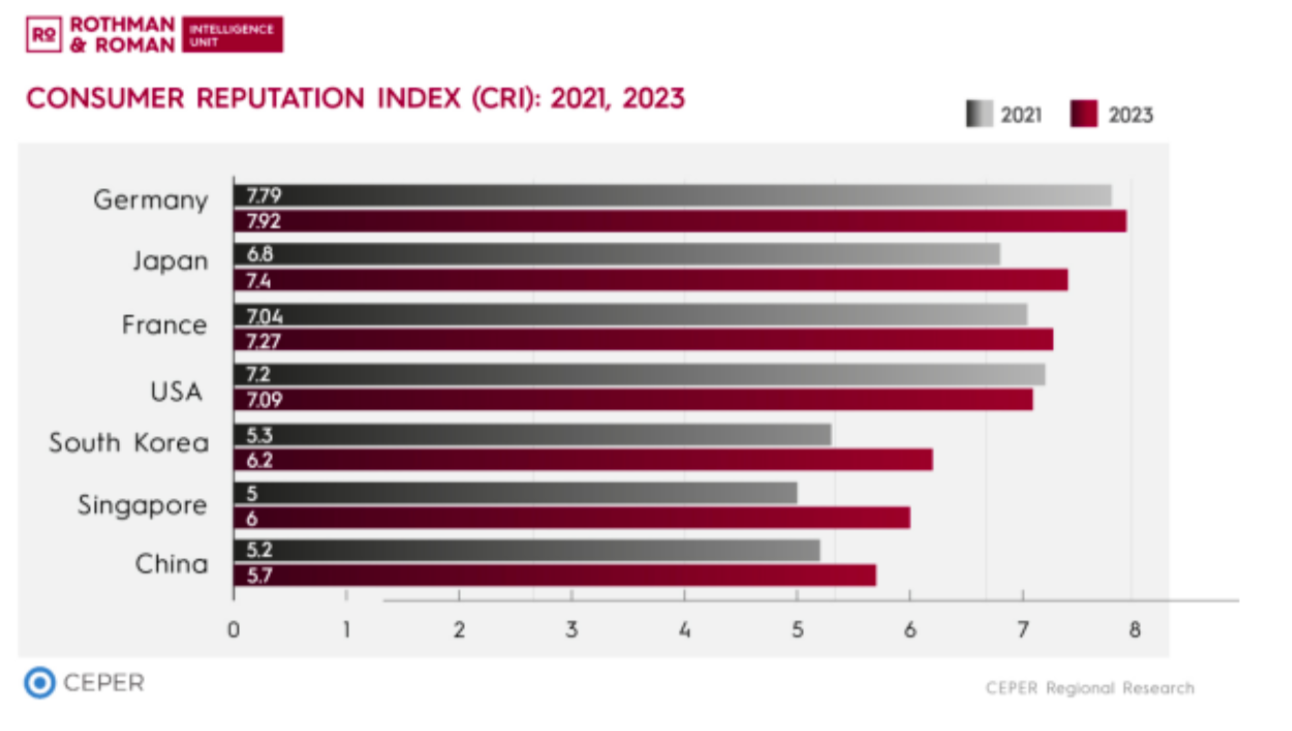(Singapore 17 May 2023) Singapore has registered the most significant hike among the rankings in the Consumer Reputation Survey from the perception of Central and Eastern Europe (CEE) consumers, Rothman and Roman Intelligence Unit (RRIU) announced today in its latest survey results.
Among all the countries surveyed, Singapore climbed from 5 to 6 in the last 2 years, into 3rd place in Asia, overtaking China, RRIU said.
“Our research highlights that the perception of a country has a strong effect on consumers’ choices and the tendency in CEE is to trust products and services depending on their country of origin,” said RRIU lead researcher Nora Hajdu.
 The research was conducted in cooperation with regional researcher CEPER. The Consumer Reputation Index (CRI), generated from the survey, shows the valuation of a list of countries on a scale of 1-10. Scores below 5 indicate a negative sentiment, while scores above 5 show a positive perception, meaning consumers tend to trust more in products or services from countries with higher CRI scores.
The research was conducted in cooperation with regional researcher CEPER. The Consumer Reputation Index (CRI), generated from the survey, shows the valuation of a list of countries on a scale of 1-10. Scores below 5 indicate a negative sentiment, while scores above 5 show a positive perception, meaning consumers tend to trust more in products or services from countries with higher CRI scores.
As consumers in CEE countries develop a more positive perception of Asian economies, including Singapore, there may be increased demand for Singaporean manufactured products and services. This presents an opportunity for Singapore to expand its exports and strengthen its trade relationships with CEE countries, RRIU analysts said.
The growing perception of Asian economies as innovative and technologically advanced may also increase competition for Singaporean businesses in the global market. Singaporean businesses may need to innovate and invest in research and development to remain competitive with other Asian economies in the industries where they operate, RRIU analysts said.
The changing perceptions of consumers in CEE countries towards Asian economies could also have implications for Singapore’s talent pool. As more people in CEE countries become interested in working and studying in Asia, including Singapore, this could lead to a larger pool of skilled and talented workers and students in Singapore, RRIU analysts said.
Besides Singapore, the survey results also show that the perceptions of consumers from Central and Eastern Europe (CEE) towards Asian economies have undergone significant changes in general.
This can be attributed to the growth of Asian economies, such as China, Japan, and South Korea, which have become major players in global trade and investment. Consumers in CEE countries are increasingly exposed to Asian products, brands, and cultural influences, which has helped to shape their perceptions of Asian economies, RRIU said.
Evidently, there has been an increase in awareness and interest in Asian economies among consumers in CEE countries. In the past, there was a perception that Asian economies were primarily low-cost producers of basic goods and services. However, as Asian economies have developed and diversified, this perception has changed. Consumers in CEE countries are now more likely to view Asian economies as innovative technologically advanced, and competitive in a range of industries, RRIU said.
Rothman and Roman Intelligence Unit said its Customer Economic Survey was conducted three times between January 2021 and January 2023, asking 10,000 customers in 10 countries in the region: Austria, Poland, Czechia, Slovakia, Hungary, Romania, Slovenia, Serbia, Croatia, and Bulgaria, between 1 October 2022 and 31 January 2023. The survey questioned 1,000 consumers in each of these 10 countries, with a representative sample regarding age, gender, place of residence, and education, employing the Computer Assisted Telephone Interview (CATI) methodology.





































